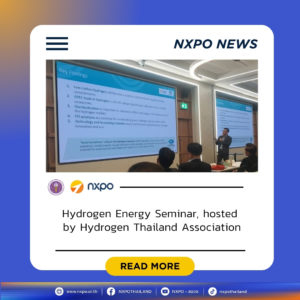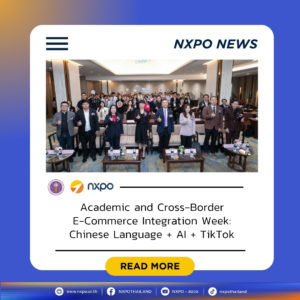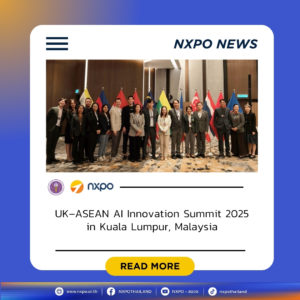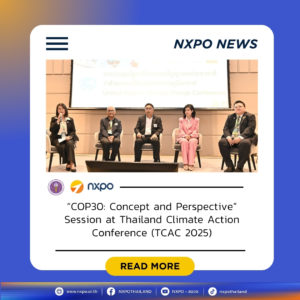NXPO and Thailand Science Research and Innovation (TSRI) recently organized a meeting to launch their joint initiative to create the Science Research and Innovation (SRI) Consortium for Net Zero. The forum brought together stakeholders from the public and private sectors, as well as academic institutions, to discuss this initiative.

In his opening statement, NXPO President Dr. Kitipong Promwong emphasized the significance of this meeting, marking the formation of the consortium which will actively support Thailand’s goals to achieve carbon neutrality by 2050 and attain net zero emissions by 2065. This consortium is expected to carry out the following important tasks: 1) promoting net zero as a catalyst for enhancing competitiveness and attracting investments, 2) strengthening innovation capacity, 3) improving ease of doing business through regulatory reforms and inter-agency cooperation, and 4) involving the public through education, manpower development and awareness creation. Initially focused on research and innovation, the consortium is expected to broaden its membership to include users of net zero technologies, thereby nurturing a comprehensive ecosystem.

Dr. Kitipong also highlighted the work and initiatives relating to net zero that have been undertaken by various organizations within the higher education, science, research, and innovation system. Program Management Units have launched funding programs dedicated to net zero research and innovation, with universities spearheading technology development and deployment. Numerous pilot projects have been launched through public-private partnerships to achieve diverse models for green cities. International collaborations have been formed to support endeavors such as technology needs assessment as well as seeking climate technology technical and financial assistance. Notable initiatives include the Green Campus, which encourages universities to integrate climate technologies on their campuses, and the Saraburi Sandbox, aimed at designing a blueprint for a city to undertake a net-zero transition.
NXPO Vice President Dr. Surachai Sathitkunarat outlined the goals of the SRI Consortium for Net Zero, positioning it as a driver of Thailand’s net zero aspirations, a generator of positive impacts on the economy, society, and the environment, and a facilitator of a low-carbon society. The consortium’s roles will include: 1) serving as a central coordinating body for net zero technology and innovation information, 2) fostering a net-zero ecosystem through support and promotion measures, and 3) establishing domestic and international collaborative networks for net zero research and human resource development.

Furthermore, Dr. Surachai shared progress on the development of Thailand’s hydrogen roadmap with support from the Climate Technology Centre and Network (CTCN). Thailand is in the process of developing a national hydrogen strategy, which will transition the country to clean hydrogen. The country is seeking expertise in assessing the impact of hydrogen technology and developing technology for industrial applications, and in need of resources to launch pilot projects. As part of the roadmap, a report on suitable clean hydrogen production technology for Thailand is being prepared. Clean hydrogen will reduce carbon emissions in Thailand’s four main industries: cement, oil refinery, road transportation, and energy, with an expected reduction of over 50 million tons of carbon dioxide, equivalent to more than THB 1 billion.


The meeting also featured a presentation on SRI system and 2023-2027 SRI Plan by TSRI Vice President Assoc. Prof. Dr. Pongpan Kaewtatip, a progress report on Thailand’s CCUS Technology Roadmap by TSRI Senior Expert Dr. Pongvipa Lohsomboon, and presentations on net-zero funding programs by representatives from six funding agencies including PMU-A, PMU-B, PMU-C, the National Research Council of Thailand (NRCT), the National Innovation Agency (NIA), and the Agricultural Research Development Agency (ARDA). Various funding programs dedicated to the net zero goal were introduced, encompassing energy, circular economy, low-carbon economy, electric vehicles, and agricultural innovation.
During the meeting, participants offered input on the structure, expectations, action plans, and their potential contributions to the consortium. It was suggested that the consortium should also address industries by sectors, and the working group should include representatives from the private sector to bridge the gap between research and practical implementation. Effective communication and knowledge and technology exchange among ministries and agencies were also emphasized as vital components of the consortium’s activities.








